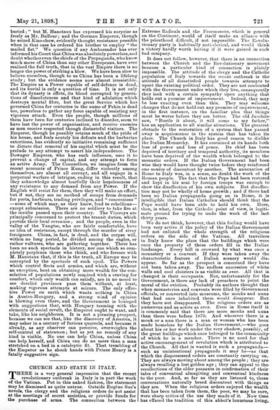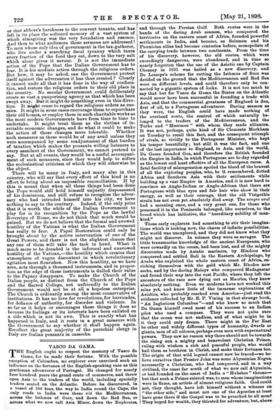CHURCH AND STATE IN ITALY. T HERE is a very general
impression that the recent revolutionary outbreak in Italy is in part the work of the Vatican. Pat in this naked fashion, the statement may be dismissed as quite untrue. Outside Eugene Sue's novels, the clergy and the religious orders do not assist at the meetings of secret societies, or provide funds for the purchase of arms. The connection between the Extreme Radicals and the Freemasons, which is general on the Continent, would of itself make an alliance with the priesthood difficult, if not impossible. The Revolu- tionary party is habitually anti-clerical, and would think a victory hardly worth having if it were gained in such bad company.
It does not follow, however, that there is no connection between the Church and the Revolutionary movement. because a particular kind of connection is plainly impossible. The attitude of the clergy and the Catholic population of Italy towards the recent outbreak is the attitude of all dissatisfied people towards attempts to upset the existing political order. They are not contented with the Government under which they live, consequently they look with a certain sympathy upon anything that holds out a promise of improvement. Indeed, they may be less exacting even than this. They may welcome changes that do not hold out any promise of improvement, in the first instance, on the familiar plea that things. must be worse before they are better. The old Jacobite- saw, " Bustle it about, it will come to my father,' has an application to all similar situations. The greatest obstacle to the restoration of a system that has passed away is acquiescence in the system that has taken its . place. The Church in Italy has good reason to dislike the Italian Monarchy. It has sustained at its hands both loss of power and loss of pence. Its chief has been deprived of territory and temporal authority, its members have been deprived of the wealth which belonged to the monastic orders. If the Italian Government had been wise they would have thought twice before they reinforced one source of discontent by another. The annexation of Rome to Italy was, in a sense, no doubt the work of the Roman people. The fact that the Pope had been restored and kept in his seat by foreign troops was enough to show the disaffection of his own subjects. But disaffec- tion may not be wholly of home growth ; and if there had been no Italian propaganda going on in Rome, it is intelligible that Itahan Catholics should think that the Pope would have been able to hold his own. Here, then, is what, from the Catholic point of view, is legiti- mate ground for trying to undo the work of the last thirty years.
We do not think, however, that this feeling would have been very active if the policy of the Italian Government had not enlisted the whole strength of the religious-- orders on the side of the Vatican. All travellers in Italy know the place that the buildings which were once the property of these orders fill in the Italian landscape. Every hill is crowned by what was once a- monastery or a convent. If they were taken away the characteristic feature of Italian scenery would dis- appear. So far as the prospect is concerned they have not been taken away. The endless succession of white walls and cool cloisters is as visible as ever. All that is changed is their occupants. Nor, unfortunately for the Government, is there any lack of preachers to point the moral of the eviction. Probably its authors thought that when monasteries and convents were filled by Government officials, or converted into museums, the monks and nuns- that had once inhabited them would disappear. But. they have not disappeared. The religious orders are as numerous and as active as ever. Even in Rome itself it is commonly said that there are more monks and nuns than there were before 1870. And wherever there is a, monk or a nun there is a man or woman who has been made homeless by the Italian Government, —who goes about his or her work under the very shadow, possibly, of the great buildings which once belonged to the community, of which he is a member. There is no need for that active encouragement of revolution which is attributed to the Church. All that is wanted is such a propaganda— such an unintentional propaganda it may be—as that which the dispossessed orders are constantly carrying on. They are always moving about among the people ; they are- always recalling a lost golden age ; they can appeal to the- recollections of the older peasants in confirmation of their- tales of conventual almsgiving and conventual kindness, to the poor. And, so far as they are listened to, these conversations naturally breed discontent with things as they are. When the religious orders enjoyed the wealth that has been taken from them, the poor, we may be sure,. were sharp critics of the use they made of it. Now time has effaced the tradition of this abbot's luxurious living, or that abbess's harshness to the convent tenants, and has left in its place the softened memory of a vast system of which almsgiving was the very foundation and essence. And then to what audiences these sermons are addressed! To men whose only idea of government is the tax-gatherer, who live under a searching fiscal tyranny which taxes every fraction of the food they eat, down to the very salt which alone gives it savour. It is not the immediate action of the Pope that the Italian Government has to fear. It is his mediate action through the religious orders. But how, it may be asked, can the Government protect itself against the adversaries it has thus created ? Clearly it cannot undo all that it has done in the way of confisca- tion, and restore the religious orders to their old place in the country. No secular Government could deliberately create so vast a pauperising agency as that which has been swept away. But it might do something even in this direc- tion. It might cease to regard the religious orders as ene- mies. It might in some cases encourage them to repurchase their old homes, or employ them in such charitable works as the most modern Governments have from time to time to undertake. It might treat them as the victims of in- evitable economic changes, and do what it could to make the action of those changes more tolerable. Whether such measures as these would be of any avail unless they were accompanied by some readjustment of that burden of taxation which makes the peasants willing listeners to every assailant of the Government, we cannot pretend to say. But at all events, they would be a useful accompani- ment of such measures, since they would help to soften the ecclesiastical criticism of which they will otherwise be the object.
There will be many in Italy, and many also in this country, who will say that every effort of this kind is an effort to bring about an impossible reconciliation. If by this is meant that when all these things had been done the Pope would still hold himself unjustly dispossessed of his dominions, and still refuse to recognise the adver- sary who had intruded himself into his city, we have nothing to say to the contrary. Indeed, if the only prize that it is worth the while of the Italian Government to play for is its recognition by the Pope as the lawful Sovereign of Rome, we do not think that much would be gained. But we do not believe that the formal and avowed hostility of the Vatican is what the Italian Government has really to fear. A Papal Restoration could only be brought about by the active intervention of one of the Great Powers, and there is not the slightest chance that any one of them will take the task in hand. What is much more to be dreaded is the informal and unavowed hostility of the Vatican,—the hostility which creates that atmosphere of vague discontent in which revolutionary agitation most flourishes. Now this hostility, as we have seen, acts through a thousand instruments, and in propor- tion as the edge of these instruments is dulled their value to the Papacy disappears. To make the Church of the Italian people, as distinct from the Church of the Pope and the Sacred College, not unfriendly to the Italian Government would not be at all a hopeless enterprise. The Church is ordinarily among the most conservative of institutions. It has no love for revolutions, for barricades, for defiance of authority, for disorder and violence. In so far as it helps or encourages these things it does so because its feelings or its interests have been enlisted on a side which is not its own. This is exactly what has happened in Italy, and it rests in a great measure with the Government to say whether it shall happen again. Recollect the great majority of the parochial clergy in Italy are Italian peasants in cassocks.



































 Previous page
Previous page